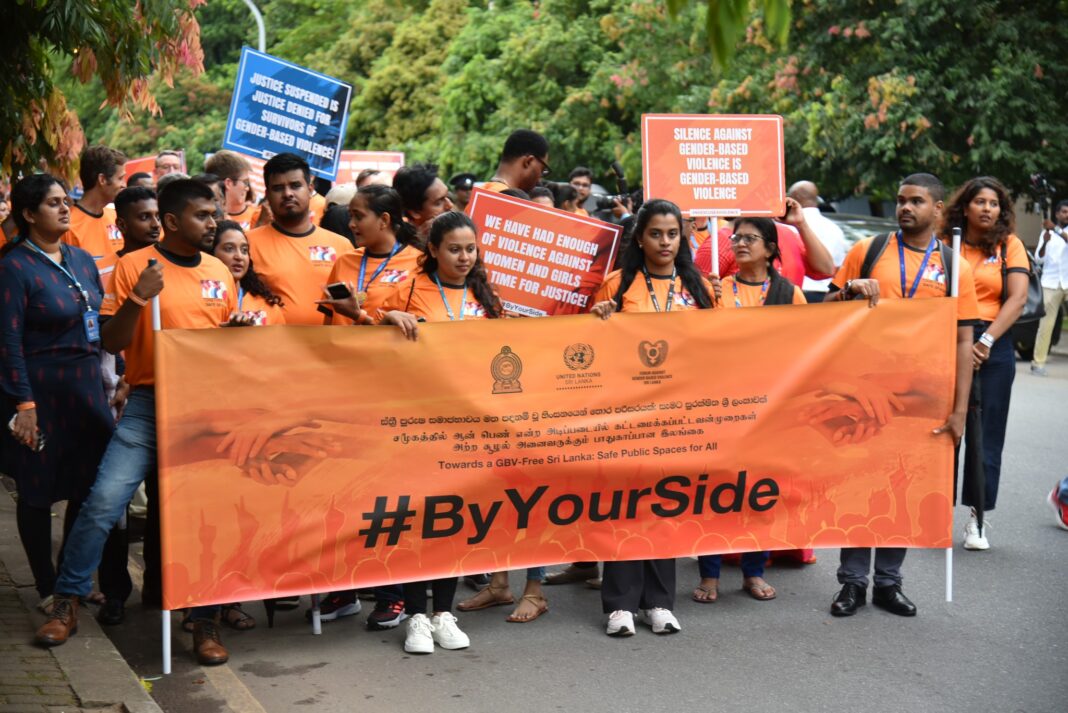Image courtesy of UN Sri Lanka FB.
Gender-based violence (GBV) continues to cast a long shadow over Sri Lankan society, despite laws and policies meant to curb it. The issue is pervasive, affecting countless women, children, and even men, cutting across all social and economic divides. Yet, its persistence raises urgent questions about societal attitudes, systemic failures, and the enforcement of existing laws.
Statistics paint a grim picture. According to the Sri Lanka Demographic and Health Survey (DHS) of 2016, 17 per cent of ever-married women aged 15-49 reported experiencing physical or sexual violence at the hands of their intimate partners. Experts suggest this figure underrepresents the problem, as many survivors hesitate to report abuse due to fear, stigma, and societal pressure. Beyond domestic violence, harassment in public spaces and online platforms has become increasingly common. A 2020 survey revealed that 90 per cent of women had faced sexual harassment on public transport, highlighting the unsafe environment women navigate daily. Children, too, are alarmingly vulnerable, with over 15,000 child abuse complaints reported to the National Child Protection Authority in 2021 alone.
These figures demand critical reflection. Why, despite legal frameworks like the Prevention of Domestic Violence Act (2005), does GBV remain so widespread? Are these laws poorly enforced, or are they being undermined by cultural attitudes that perpetuate male dominance and silence victims? In many households, women are urged to endure abuse to maintain ‘family honour,’ while male aggression is excused as frustration or a natural display of authority. Such attitudes not only discourage reporting but also normalise violence, making it a deeply-ingrained societal issue.
Law enforcement’s role in perpetuating this crisis must also be questioned. Survivors often report facing humiliation or dismissal when approaching authorities, who are frequently untrained in handling GBV cases sensitively. This creates a hostile environment, discouraging victims from seeking justice. If women cannot trust the system meant to protect them, how can they hope for safety or justice?
A significant part of the problem lies in the lack of comprehensive support systems for survivors. Shelters, counselling services, and legal aid remain scarce, particularly in rural areas, leaving many women and children without refuge. The legal and judicial processes, often lengthy and traumatising, further alienate survivors. Cyberviolence is another growing concern, with insufficient measures in place to combat harassment in digital spaces.
Addressing GBV in Sri Lanka requires a multifaceted approach. Education is crucial—schools must teach gender sensitivity and equality to challenge harmful stereotypes from a young age. Public awareness campaigns should aim to reshape societal attitudes, fostering community responsibility in preventing violence. Law enforcement must undergo rigorous training to handle cases with compassion and professionalism, ensuring survivors feel safe to report abuse. Establishing dedicated GBV desks at Police Stations, staffed by female officers, could create a more supportive environment.
Sri Lanka must also strengthen its support systems. Expanding access to shelters, especially in rural areas, and providing free counselling and legal aid are essential steps. Addressing online harassment with stricter laws and efficient reporting mechanisms is equally urgent. Importantly, engaging men and boys as allies in the fight against GBV is vital for changing the cultural narrative that excuses male aggression and subjugates women.
This is not merely a women’s issue; it is a societal crisis that undermines the values of equality, dignity, and safety. The question Sri Lanka must confront is this: how many more lives must be shattered before we take decisive action? Complacency has no place in addressing an issue of this magnitude.
Gender-based violence challenges us to look beyond rituals of awareness and take meaningful action. It demands a collective commitment to reshaping societal attitudes, holding institutions accountable, and ensuring that every survivor is heard, supported, and protected. Only then can we hope to build a society where violence no longer defines the experiences of so many. Let this not just be another moment of reflection, but a call to action for real, lasting change.
